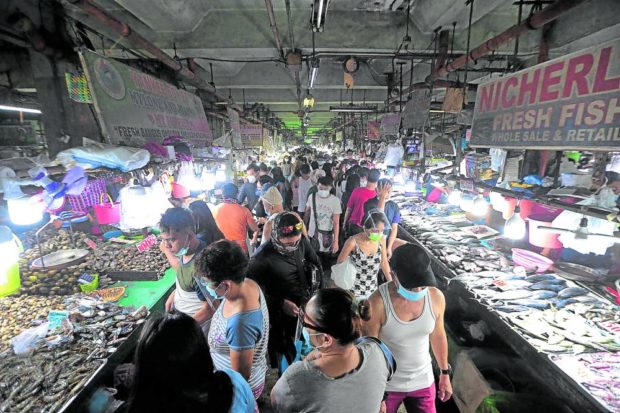Neda chief: Not higher, but sustained cash aid until 2023

Filipino consumers face rising food inflation this year due to higher global oil prices. —GRIG C. MONTEGRANDE
MANILA, Philippines—While the Marcos administration will no longer add to this year’s subsidies being given to sectors hurting from expensive fuel, more cash aid would likely be included in the 2023 national budget, the country’s chief economist said on Monday (July 4).
At a press briefing, Socioeconomic Planning Secretary Arsenio Balisacan rejected proposals for universal subsidies to cover food and oil expenses of all Filipinos amid high prices. “What we can do is focus on the limited resources we have in addressing the needs of the poor and the vulnerable,” said Balisacan, who heads the state planning agency National Economic and Development Authority (Neda).
Balisacan said that as poverty incidence would rise alongside costly food, the ongoing targeted subsidy program for households belonging to the poorest 50-percent income earners, public utility vehicle (PUV) drivers and operators, as well as farmers and fisherfolk augured well for fiscal prudence.
During the previous Duterte administration, the government set aside a total of P47.5 billion in financial assistance to those worst hit by skyrocketing oil prices: P41.4-billion unconditional cash transfers to the bottom 50-percent households, worth P500 monthly for six months; P5-billion fuel subsidies for PUVs; and P1.1-billion fuel discounts to agricultural producers.
The Department of Budget and Management (DBM) so far released to the Department of Social Welfare and Development (DSWD) P6.2 billion in cash subsidies for beneficiary-households, on top of P3 billion in fuel subsidies and discounts.
Balisacan said that given the tight fiscal space wrought by the prolonged COVID-19 pandemic, the Marcos administration can no longer afford to increase this year’s subsidies.
But for next year, Balisacan said the economic team will recommend again the provision of targeted subsidies amid expectations of high consumer prices lingering for longer. “Subsidies must be directed to sectors or population groups who deserve them the most — these are the poor and the vulnerable,” he said.
Budget Secretary Amenah Pangandaman earlier said the Marcos administration was looking at a “slightly” bigger 2023 budget — its first full-year spending plan — than the record P5.268 trillion set by former president Duterte’s economic managers, but only if government coffers can afford it.
The 2023 ceiling approved by the Development Budget Coordination Committee (DBCC) last May was only 4.9-percent higher than this year’s P5.02-trillion appropriations, which had increased 11.5 percent from last year’s P4.51 trillion.
Pangandaman had noted that some of the DBM’s recent releases came from unprogrammed funds, mainly excess revenues partly from the bigger-than-projected taxes collected from expensive oil.
The doleouts given by the Duterte administration to sectors most badly hit by high fuel prices were funded by these incremental revenues. But borrowings, which also fund unprogrammed appropriations, may have already been stretched for this year, Pangandaman had said.
Pangandaman had said the next administration may hike its yearly national budgets “if we have extra revenues and our economy’s doing good until the end of the year and the coming years.”
The budget chief had said the DBM would not hurry and take advantage of the one-month deadline to submit its 2023 budget proposal following the President’s State of the Nation Address (Sona) this month.
RELATED STORIES
As 6 percent inflation looms, short-term debt yields continue to rise
P6.2B released by DBM to DSWD for cash aid to cushion oil price spikes
TSB
